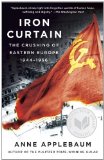Summary | Excerpt | Reviews | Beyond the Book | Readalikes | Genres & Themes | Author Bio

Critics' Opinion:
Readers' Opinion:
First Published:
Oct 2012, 608 pages
Paperback:
Aug 2013, 640 pages
 Book Reviewed by:
Book Reviewed by:
Kim Kovacs
Buy This Book
Because American Cold Warriors openly positioned themselves as opponents of totalitarianism, Cold War sceptics naturally began to question the term, and to ask what it meant. Was 'totalitarianism' a real threat, or was it merely an exaggeration, a bogeyman, an invention of Senator Joseph McCarthy? Throughout the 1970 s and 1980s, revisionist historians of the USSR argued that even Stalin's Soviet Union had never really been totalitarian at all. They claimed that not all decisions in the Soviet Union were really taken in Moscow; that local police were just as likely to initiate terror as those at the top of the hierarchy; that central planners were not always successful in their attempts to control the economy; that mass terror had created 'opportunities' for many in society. Among some, the term 'totalitarian'came to be seen as crude, imprecise and overly ideological.
In fact, many of the 'orthodox' theorists of totalitarianism had made a number of the same points. Few had claimed that totalitarianism worked. On the contrary, 'because totalitarian rule strives for the impossible and wants to place at its disposal the personality of man and destiny, it can be realized only in a fragmentary manner,' wrote Friedrich: 'This is precisely why the consequences of the totalitarian claim to power are so dangerous and oppressive, because they are so hazy, so incalculable, and so difficult to demonstrate . . . This contortion follows from the unfulfillable aspiration to power: it characterizes life under such a regime and makes it so exceedingly difficult for all outsiders to grasp.'
Political theorists in more recent years have taken this revisionist argument further. Some have argued that the term 'totalitarian' is truly useful only in theory, as a negative template against which liberal democrats can define themselves. Others find the word altogether meaningless, explaining that it has become a term which means nothing more than 'the theoretical antithesis of Western society', or else simply 'people we don't like'. A more sinister interpretation holds that the word 'totalitarianism' is self-serving: we use it only in order to enhance the legitimacy of Western democracy.
In popular speech, the word totalitarian isn't so much self-serving as overused.
Democratically elected politicians are described as totalitarian (e.g. 'Rick Santorum's Totalitarian Instincts'), as are governments or even companies (one can read of 'The US 's march towards totalitarianism' or learn that Apple has a 'totalitarian approach to its app store'). Libertarians, from Ayn Rand onwards, have used the word to describe progressive liberals. Progressive liberals (and indeed conservatives) have used the word to describe Ayn Rand. The word is nowadays applied to so many people and institutions that it can sometimes seem meaningless.
Yet although the very idea of 'total control' may now seem ludicrous, ridiculous, exaggerated or silly, and although the word itself may have lost its capacity to shock, it is important to remember that 'totalitarianism' is more than an ill-defined insult. Historically, there were regimes which aspired to total control. If we are to understand them – if we are to understand the history of the twentieth century – we need to understand how totalitarianism worked, in theory and in practice. Nor is the notion of total control completely old-fashioned. The North Korean regions set up along Stalinist lines, has changed little in seventy years. Though new technology now seems to make the notion of total control harder to aim for, let alone achieve, we can't be certain that mobile phones, the internet and satellite photographs won't eventually become tools of control in the hands of regimes which also aspire to be 'all embracing'. 'Totalitarianism' remains a useful and necessary empirical description. It is long overdue for a revival.
Excerpted from Iron Curtain by Anne Applebaum. Copyright © 2012 by Anne Applebaum. Excerpted by permission of Doubleday. All rights reserved. No part of this excerpt may be reproduced or reprinted without permission in writing from the publisher.





The Funeral Cryer by Wenyan Lu
Debut novelist Wenyan Lu brings us this witty yet profound story about one woman's midlife reawakening in contemporary rural China.
Your guide toexceptional books
BookBrowse seeks out and recommends the best in contemporary fiction and nonfiction—books that not only engage and entertain but also deepen our understanding of ourselves and the world around us.